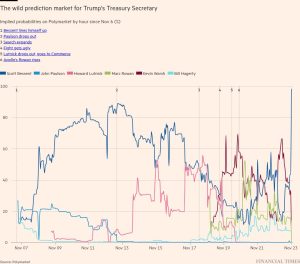Competitive socialising proves a big hit

On Thursday afternoon, a few minutes walk from Oxford Circus, groups from offices in central London stream into Sixes Social Cricket to have a go at batting against a virtual bowler. Among them is Nick Greenwood, on a work outing with 11 colleagues from his fintech employer.
“When you go to a pub, you feel like you have to have a drink. This is more inclusive,” said Greenwood, who has been on similar nights out at darts bar Flight Club and golf simulator Pitch. “Sport is so different to work, you learn a bit more about a person. People can take their work heads off a bit.”
The idea for Sixes Social Cricket — a bar built around cricket nets with computerised bowlers but real balls fired out of a hole in the wall — was born during Covid. But its launch in the back of a Fulham pub five days before the Omicron variant hit in 2021 meant the business struggled to win backers.
“I got laughed out of about 30 meetings. They were like, ‘Are you stupid? That sounds like the worst idea in the world’,” said co-founder Calum Mackinnon.
But the business has since taken off, with 16 locations in the UK and its first franchise in Trinidad & Tobago. Investors now include top English cricketers Ben Stokes, Stuart Broad and Jos Buttler.


Sixes is part of a new wave of competitive socialising venues built around a game or a sport — such as darts, mini-golf and bowling — and follows in the footsteps of more established groups including Puttshack, Flight Club and Electric Shuffle. All began in the UK but have grown internationally.
In Britain, openings offering a wide range of activities, from axe throwing and pétanque to Formula One racing simulators and virtual clay pigeon shooting, have fuelled the growth of the segment.
The number of competitive socialising venues in the UK has soared by 40 per cent since 2018 to nearly 600, according to Savills, marking “the biggest development the leisure sector has seen in decades”. The estate agency expects more than 800 sites by 2029.

Tom Whittington, director of commercial research at Savills, said that alongside food, beverage and other leisure spaces, such venues were “almost like a cultural link [for a city centre] to become relevant to consumers”.
People in the industry said several underlying changes in consumer behaviour had underpinned the trend. The pandemic led to a broader shift in spending on goods to experiences, while rising living costs have pushed some people to focus on seeking value for money when spending socially. Technology has also helped draw younger customers.
Chris Sterling, client director at consultancy CGA, said consumers were “discerning . . . We can justify the spending because we’re not just sitting there having a drink but having activities where we’re enjoying ourselves.”
Many young people are also drinking less alcohol, hitting late-night venues particularly hard, while corporate clients find games foster networking or team building.
Matt Grech-Smith, co-founder of Swingers crazy golf sites, said almost 40 per cent of its business came from corporate bookings, with clients including investment bank Goldman Sachs, tech company Meta and Manchester United football club.
“There’s a great priority on convening teams and companies together for social events, because they’re not socialising in the office,” with many employees working from home since Covid, Grech-Smith said.
“It used to be more acceptable for everyone to go to a ‘happy hour’ and have a load of drinks. Now, companies can’t be seen to do that in the same way,” in part because of changing workplace culture and greater awareness of alcohol-related problems, he added.
Tim Wilks, founder of bowling alley chain Lane7, said it was much easier to find sites now compared with before the pandemic, which had a “domino effect” after department store and shopping centres closed.
“That really meant that landlords needed to fill a lot of large square footage units, and we were a great option for that . . . We definitely saw the market change,” he said.
Lane7, which launched in Newcastle in 2013, now has 19 sites in the UK, Ireland and Germany and is set to open between six and 10 sites a year — mainly in Europe — for the next two years.
At the Westfield London shopping centre in the west of the capital, areas dedicated to competitive socialising and leisure have jumped by 50 per cent since Covid, occupying more than 100,000 square feet of lettings.
Shoppers were “coming for a day out for an experience, and that experience will be a combination of retail, wellness, food and beverage and of competitive socialising and entertainment”, said Scott Parsons, UK chief operating officer at Unibail-Rodamco-Westfield.
Mackinnon said London was “like the Silicon Valley of social entertainment . . . You have all these American private equity firms coming over . . . to check out all the new concepts”.


But as competition rises, some activities including virtual reality are fading; and while operators, landlords and analysts forecast more growth, they also expect consolidation.
“There was [previously] a bit of a gold rush, and people looked around for any activity that could possibly be combined with some food and some alcohol,” said Grech-Smith. But some activities “don’t sit well with alcohol and socialising”, he added.
Wilks predicted “a right sizing” in some of the busiest UK cities, with “some of the stronger players considering taking some of the smaller brands into their wider estates”.
Back at Sixes, which was fully booked for much of Thursday, Mackinnon said he hoped new game modes and up-to-date leader boards sent to customers would boost the number of repeat bookings. “Tapping into people’s competitive kind of nature, I think, is a really strong motivator,” he said.
#Competitive #socialising #proves #big #hit






